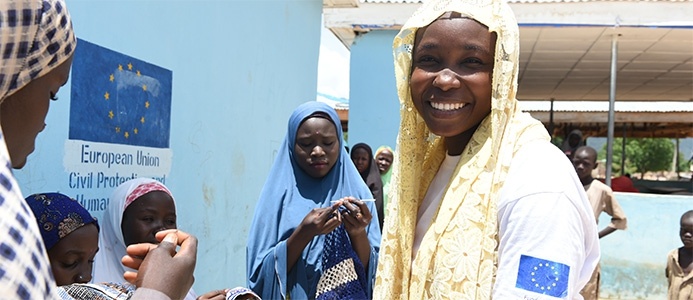European Union Says Hopes Have Been Restored In Northeast Nigeria Through Intervention Programmes
Premiering a documentary about the struggles of the displaced people in Borno State, the EU said they had committed about €130 million in the last four years to the efforts of the Borno government to rebuild and rehabilitate communities affected by insurgency.

The European Union (EU) has said through its intervention programmes, it has restored hope to millions of people displaced by the Boko Haram insurgency in Borno State, Northeast Nigeria.
The EU explained that through funds committed in the last four years to conflict-affected areas in Borno, it has contributed to the restoration of peace and hope to people in the state.
Ambassador Samuela Isopi, Head of EU Delegation to Nigeria and ECOWAS said in Abuja, Nigeria’s capital at the premiere of HOPE, a documentary film about the struggles of the displaced people in Borno, that the EU had committed about €130 million in the last four years to the efforts of the Borno State Government to rebuild and rehabilitate affected communities.
“This funding support alone has contributed to the restoration of basic services and livelihoods which covers health, agriculture, water, sanitation, social protection, education, conflict mitigation and cohesion among displaced populations and their host communities,” Isopi said on Monday, Oct. 25 during the premiere of the documentary.
She further highlighted that as part of efforts to help meet the basic needs of the conflict-affected people, the EU provided over €345 million in humanitarian assistance, including the €56 million funding allocated in 2021.
“We are happy to see that the support has brought hope back to Borno State as millions of people are now returning to their communities,” she added.
The Ambassador, emphasising the motive behind the documentary, said “the main objective is creating awareness amongst the European and Nigerian populations on the impact of the conflict and humanitarian crisis affecting the people in the Northeast.”
Dogo Shettima, the Special Assistant to the Governor of Borno State on Reconstruction, Rehabilitation and Resettlement, who represented Governor Babagana Zulum at the event, remarked that the EU intervention has been helpful in restoring peace and stability to the Northeast, especially Borno State.
He expressed the state government’s appreciation of “the immense support” it was receiving from humanitarian agencies such as the EU in restoring livelihood to the people.
According to Shettima, about one million people who were displaced as a result of insurgency have been resettled due to the support of the EU.
“The EU has helped us in the areas of education and health. They have constructed so many schools in the IDP camps where people have been resettled. Through the EU, we have resettled nine out of 11 Local Government Areas in Borno State. These nine Local Governments cater to 11,000 households, amounting to over one million people,” he said.
In her remark, Sadiya Farouq, Nigeria’s Minister of Humanitarian Affairs, Disaster Management and Social Development, represented by the Deputy Director, Disaster Management in the Ministry, Abubakar Suleiman, said she was hopeful that the documentary would assist in bringing the plight of the Northeast to the attention of the general public.
Judith Rueff, the Co-Director of the documentary, said the documentary, which was produced by Factstory with funding from the EU, “is a demonstration of possibility and courage as it reminds us of the real people, the complexity and the nuances of the different conditions the people affected by this conflict live in.”
In 2019, the escalating violence and insecurity increased humanitarian needs in Nigeria.
It has been 11 years since an insurgency began in Northeast Nigeria, with armed opposition groups fighting the Nigerian army.
Thousands have been killed in fighting and many more by malnutrition and malaria.
People are unable to farm or sell their goods and mass displacement has resulted in catastrophic living conditions.
Support Our Journalism
There are millions of ordinary people affected by conflict in Africa whose stories are missing in the mainstream media. HumAngle is determined to tell those challenging and under-reported stories, hoping that the people impacted by these conflicts will find the safety and security they deserve.
To ensure that we continue to provide public service coverage, we have a small favour to ask you. We want you to be part of our journalistic endeavour by contributing a token to us.
Your donation will further promote a robust, free, and independent media.
Donate HereStay Closer To The Stories That Matter




